EcholoN makes your service professional and effective.
Service management is not a side issue – it is the backbone of modern service processes. Anyone who provides services must be able to plan, control and document them reliably. Well-designed service management software helps you keep track of all processes and improve them in the long term – regardless of your industry or company size.
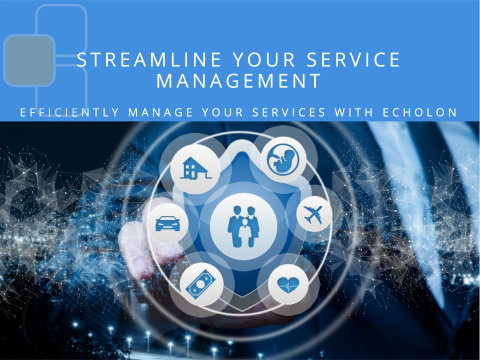
Service as the key to customer loyalty
Service management does not begin when something goes wrong – it accompanies a product throughout its entire life cycle. Whether in industry, retail or the ICT sector (information technology and communications electronics), sooner or later every product needs support. And this is precisely where the quality of a company's positioning becomes apparent.
Today's customers expect more than just a functioning product – they are looking for a solution. And this often only comes about through sound advice, complementary services and professional support. Those who excel in these areas stand out from the competition – and build lasting trust.

“The Purpose of Business is to Create and Keep a Customer.” Peter F. Drucker
What is Service Management?
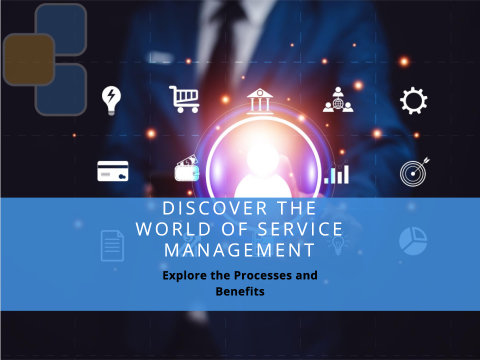
Definition of service management
Service management encompasses the control, coordination and optimisation of all processes necessary for the provision of services – from planning and execution to ongoing improvement. It is implemented as a sub-process of supply chain management or supply chain management (SCM). The aim is to provide services in such a way that they meet customer requirements, function reliably and can be operated economically.
A good service management system integrates all relevant resources: people, technologies, business processes and workflows. It ensures that services are documented, controlled and measured in a traceable manner – based on transparent key performance indicators and clearly defined responsibilities.
Typical tasks in service management:
- Definition and compliance with service level agreements (SLAs)
- Documentation and evaluation of customer feedback
- Continuous improvement of processes and interfaces
- Management of resources, personnel and technical systems
Whether in IT, mechanical engineering or field service, service management software such as EcholoN helps companies to organise their services professionally and systematically increase customer satisfaction.
Understanding service management processes
Service management processes form the operational foundation for the provision, control and improvement of services. They cover the entire life cycle of a service – from planning and implementation to ongoing operation and further development.
The most important process areas at a glance:
Service strategy
This defines which services are to be offered, how they contribute to the company's success and which goals are to be achieved. The service strategy sets the framework for all further steps in service management.
Service design
In this phase, the services are designed in detail. Processes, roles, resources and tools are defined with the aim of developing a coherent and implementable service concept.
Service transition
Service transition ensures that new or changed services are introduced in a structured manner. Changes are documented, tested and transferred to ongoing operations in a controlled manner in order to minimise risks and avoid disruptions.
Service operation
This is where the actual operation of the services takes place. This includes incident management, problem management, user support and compliance with service standards. The goal is stable, reliable day-to-day service.
Continuous service improvement
This process ensures that services do not remain static. Based on feedback, monitoring data and reviews, weak points are identified and improvement measures are implemented.
All of the processes mentioned are geared towards a central goal: designing services that meet or exceed customer expectations. A comprehensive service management system is essential for transparency, controllability and continuous optimisation.
Why service management processes are important for companies

Service management processes are crucial to ensure optimal service quality, which in turn contributes to customer loyalty. Through efficient service management, organisations can increase customer satisfaction and ensure service continuity, leading to long-term benefits.
In addition, effective service management processes offer the following benefits for an organisation:
Process optimisation
With clear, well-defined processes, organisations can adapt and improve their services to increase efficiency and effectiveness.
Cost control
Effective service management helps to reduce or eliminate unexpected costs by minimising service defects and failures and eliminating their causes.
Quality improvement
By continuously evaluating and improving service processes, organisations can raise their service standards and achieve higher customer satisfaction.
Risk minimisation
By systematically controlling and monitoring service processes, companies can identify risks and develop customised risk mitigation strategies.
Better supplier management
Service management can help improve relationships with suppliers by clearly defining who does what and who is responsible for what.
Improved compliance
Service management processes can help companies meet legal and contractual requirements by ensuring that services are delivered in a standardised, repeatable way.
Service management as the key to customer satisfaction
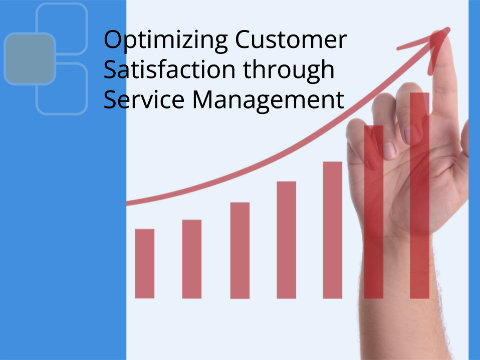
A functioning service management system plays a key role in meeting your customers' expectations – and often even exceeding them. It ensures that service processes run reliably, transparently and in line with actual requirements.
Respond faster, provide more targeted help
Structured processes, automated routines and clearly defined service levels enable requests to be processed more quickly. This not only increases response times, but also improves the quality of the response.
Automate recurring tasks
Standard processes such as appointment scheduling, material approvals or escalations can be controlled automatically via the workflow engine. This reduces processing times and takes the strain off your team – without compromising service quality.
Use information in a targeted manner
The central recording of feedback, incidents and order data provides a reliable basis for decision-making. This helps to identify bottlenecks at an early stage and make processes more customer-friendly.
Increase availability and transparency
Whether via self-service portals, status displays or automated notifications, customers – both internal and external – know where their request stands at all times. This creates trust and reduces queries.
Make quality visible
Good service management documents what has been done – and in what time. This creates measurable quality that also pays off in certifications, ratings and customer loyalty.
Control changes
Service management also includes the structured management of changes – whether to systems, processes or responsibilities. With the help of defined change processes, you can ensure that adjustments are implemented in a controlled manner without compromising service quality. Support is also available through the CIP process. Risks can be minimised, impacts planned in advance and all parties involved transparently integrated.
Evaluate data, improve services
Evaluations and reports on process times, case numbers or escalations reveal potential for development. Service management creates the basis for data-driven decisions and strategic optimisation.
With service management software such as EcholoN, you can keep track of all relevant key figures, control processes in a targeted manner and ensure that your services not only work, but also impress.
How does IT service management differ from service management?
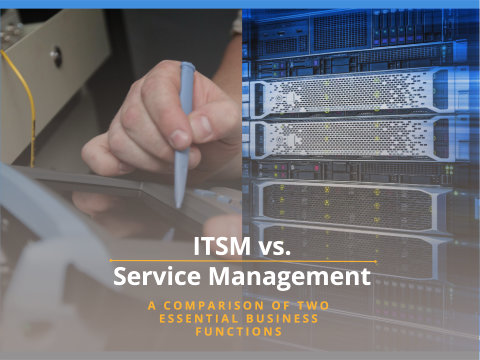
IT service management (ITSM) differs in some respects from general service management (SM). While service management encompasses the broad discipline of managing all services within an organisation across a wide range of industries, ITSM focuses specifically on the delivery of IT services. ITSM encompasses the processes required to manage and deliver IT services that meet the business requirements of an organisation's IT infrastructure. This often includes processes aimed at mechanisms for resolving IT problems, scalability and capacity management. On the other hand, service management also includes the performance of non-technological services and the strategic alignment of an organisation's overall service strategy, regardless of the type of services provided or the technology used. In summary, both disciplines are guided by a common goal of quality and service, but differ in their specific application and focus. You could also say that ITSM is ‘contained’ within service management. A good service management solution offers this in any case.
Implementation of IT service management
The implementation of IT service management enables companies to effectively manage and optimise their IT services. By integrating ITIL (IT Infrastructure Library), companies can continuously improve their service processes and maintain an efficient IT infrastructure.
Which frameworks and tools are suitable for service management?

Overview of common frameworks in service management
There are various frameworks such as ITIL, COBIT and ISO/IEC 20000 that support companies in introducing and optimising their service management. These frameworks offer proven methods and best practices for efficiently organising and continuously improving service processes.
ITIL
ITIL (Information Technology Infrastructure Library) is a comprehensive guide for the planning, provision and support of IT services in organisations. It offers proven best practices for IT service management in order to continuously improve the efficiency and quality of IT services. ITIL includes guidelines, processes, tools and roles to optimise the use of IT infrastructure.
ISO / IEC 20000
ISO/IEC 20000 is an internationally recognised standard for a Service Management System (SMS). It specifies requirements for the service provider for planning, setting up, implementing, operating, monitoring, reviewing, maintaining and improving an SMS. The requirements cover the design, transition, delivery and improvement of services to fulfil the agreed service requirements.
COBIT
COBIT (Control Objectives for Information and Related Technology) is a framework for the control and monitoring of information technology processes in organisations. It provides a set of best practices and guidelines to ensure that IT processes are efficient and secure. COBIT is often used to improve governance and compliance in IT systems.
CMMI-SVC
CMMI-SVC (CMMI for Services) is a framework that supports organisations in improving their service processes and optimising their services. It offers proven methods and best practices for service organisations to increase their efficiency and provide high-quality services. Organisations can use it to evaluate and improve their service performance.
FitSM
FitSM (Federated IT Service Management) is a standard for IT service management based on the needs of organisations with federated structures. It provides a framework for the management of IT services and supports the efficiency and quality of services, regardless of the size or scope of the organisation.
SIAM
SIAM (Service Integration and Management) is a framework developed to enable the effective integration of services from different suppliers. It provides best practices and processes to improve collaboration between different service providers and maximise overall performance. SIAM aims to reduce the complexity of service integration and ensure a consistent level of service.
In addition, organisations can integrate different frameworks, processes and standards into their service-oriented approach to meet different requirements.
Choosing the right service management tool
Choosing the right service management tool is critical to effective service delivery. Organisations can rely on powerful tools such as ServiceNow, BMC Remedy and EcholoN to automate, monitor and continuously improve their service processes.
Implementation of Enterprise Service Management
Implementing Enterprise Service Management (ESM) enables companies to integrate and optimise service processes across different departments. By managing services in a standardised way, companies can ensure efficient service delivery and a holistic view of their services.
How can service management be used across all industries?

Service management in different industries
Service management can be used in various industries such as healthcare, finance and IT to improve service quality and provide customer-centred services. Adapting service processes to the specific requirements of each industry enables companies to optimise their service delivery.
Field service management and service management processes
Field service management is an essential part of service management, especially in industries such as technology and manufacturing. By integrating service management processes, organisations can increase the efficiency of field service and ensure smooth service delivery in the field.
Company-wide service management optimisation
Companies can optimise service management across the enterprise by applying best practices from different industries and continuously improving service processes. The integration of ESM tools and the adaptation to industry-specific requirements enable companies to maximise service quality and increase customer satisfaction.
EcholoN - Your solution for structured service management
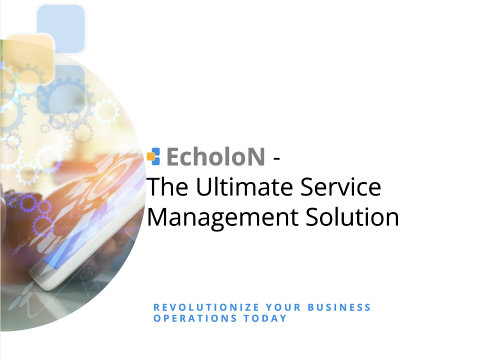
EcholoN supports companies in organising their service processes from start to finish – from the initial enquiry to the final response. The service management software has a modular structure, can be customised and integrated into existing system landscapes. This increases customer value and productivity and ensures that business objectives are met.
Key features at a glance:
- Ticket management and order control
Systematically record, prioritise and track service requests – both internal and external. - Service contracts and SLA monitoring
Manage service level agreements centrally and check compliance automatically. - Asset and device management
Link services to products, systems or components – including history and documentation. - Mobile access for field service teams
Service technicians document orders directly on site – paperless, structured and without wasting time. - Self-service portal with knowledge database
Take the pressure off your team and give customers the opportunity to find answers themselves – supported by AI-based suggestion logic. - Reporting and evaluation
Get meaningful KPIs and reports on performance, response times and process quality at any time. - Workflow engine
The integrated, flexible workflow engine automates processes and tasks. Standard templates for processes and workflows are an indispensable tool for fast action.
The modular concept of EcholoN
EcholoN covers various areas of service management. In addition to common functions such as ticket creation and service contract agreements, the framework also provides product and device information for all devices used in service operations. Employees can use the specifications to prepare for service calls by, for example, laying out replacement parts and drawing on knowledge from previous assignments. Many interfaces to well-known software and hardware are already integrated.
Manage and process service orders
The foundation for an optimal service offer is the precise planning and handling of all service assignments.
EcholoN provides the order management with all required information centrally. Thus, for example, open service orders and service assignments or order times and used material are always at a glance.
The service is supported in the handling and coordination practically and reliably.
Mobile service use
Support the work of your service technicians in the field with the mobile application from EcholoN. Be it order time recording, material consumption or a digital service report. Everything can be done on site and returned to the system. Thus, the time-consuming subsequent recording of paper-based service reports is completely eliminated.
The browser-based online application can be used on any device thanks to the latest technology. Offline as a native app for iOS, Android and Windows operating systems
Equipment and device information accessible by mobile device
Devices or products (assets) managed in EcholoN are easily and clearly available for mobile service processing (asset management).
Information such as important documents or reports on previous service calls can be stored in the device file.
Customer administration made easy
With EcholoN you manage all relevant customer data. Companies, contacts and tasks are created and assigned with one click.
Powerful self-service portal
The EcholoN self-service portal has an integrated knowledge database, which is continuously improved by machine learning AI (artificial intelligence), among other things. The intelligent tool helps the service provider and, above all, the customer, because on the one hand, specialist and experience knowledge can be made available centrally and decentrally in the company, and on the other hand, customer enquiries can be answered more quickly and in a targeted manner.
Your advantage with EcholoN
EcholoN provides clarity, reliability and a new level of quality in service management. Processes become transparent, communication more targeted – and customer loyalty measurably stronger. Whether in technical service, IT or customer management, EcholoN grows with your requirements and supports you in managing your services professionally.
Reasons for the EcholoN service management solution
Whether standard or individualized - your requirement is our benchmark
- Optimizing the control of maintenance, service and repair operations
- Increase customer satisfaction
- Faster response to requests
- Secure invoicing of all services
- Optimize the flow of information between the head office / dispatcher and customer service representatives
- Improve the recording and processing of customer-specific information
- Increase in sales by more satisfied customers
Frequently asked questions (FAQ)
What is service management?
Service management describes the structured organisation of all activities necessary for the provision of services. The aim is to deliver services in a predictable, reliable and customer-oriented manner – from the initial enquiry to implementation and optimisation.
What does a service management system include?
A service management system (SMS) bundles processes, roles, rules and tools to provide services in a controlled and standardised manner. It includes ticket management, compliance with service level agreements, resource management and ongoing quality control.
What is a service management tool?
A service management tool is a software solution that supports companies in planning, controlling and analysing their service processes. Such tools – such as EcholoN – enable structured workflows, central data storage and the integration of customers, technicians and partners.
What are the advantages of service management software?
Service management software simplifies processes, shortens response times and improves service quality. Additional benefits include
- Overview of all current and completed orders
- Automated escalations and deadline monitoring
- Reduction in manual effort
- Traceability for internal and external customers
What is the difference between IT service management and general service management?
IT service management (ITSM) refers specifically to IT services based on standards such as ITIL. General service management also includes non-technological areas such as customer service, field service and maintenance – in other words, all service-oriented processes within a company.
What methods and standards are used in service management?
Common frameworks and standards in service management are:
- ITIL (IT Infrastructure Library) for IT service processes
- ISO/IEC 20000 as an international standard for service management systems
- COBIT, CMMI-SVC, FitSM and SIAM for specific application areas and governance structures
Who benefits from a service management solution?
Service management software is suitable for companies of all sizes that need to control recurring service processes – whether in industry, IT, technical customer service or administration. It is particularly relevant where many people work together and response times are important.
Also interesting:
- Field service management software – EcholoN FSM
- Customer Service & Customer Support
- Maintenance software for reliable processes – EcholoN CMMS software
- Blog article: What is enterprise service management?
- Blog article: What is service excellence? – DIN SPEC 77224 – Generating customer enthusiasm
- Blog article: Continuous improvement process (CIP)
- Blog article: What is SLA monitoring?
- Blog article: What is enterprise asset management (EAM)?
- Blog article: Quality management in companies